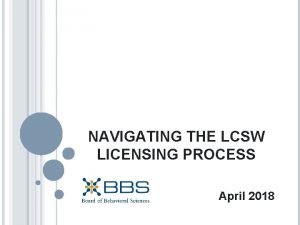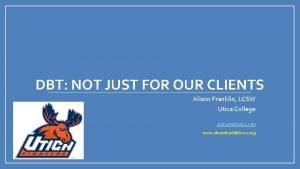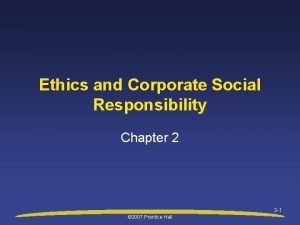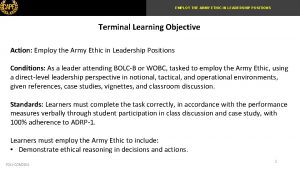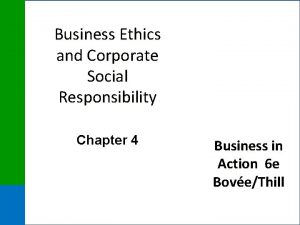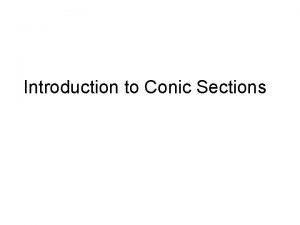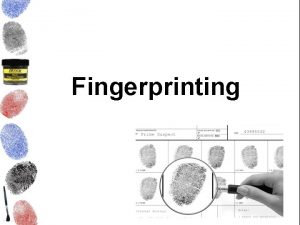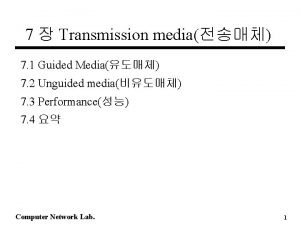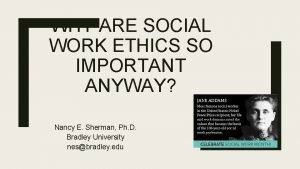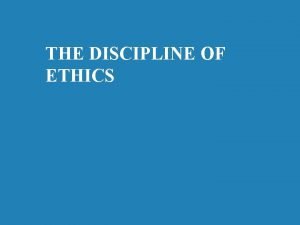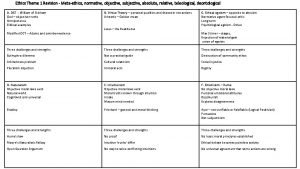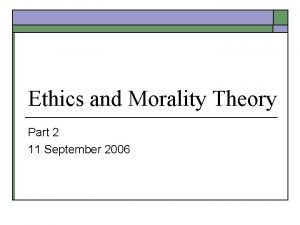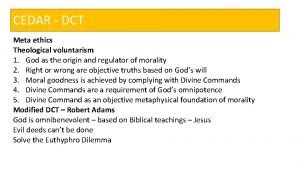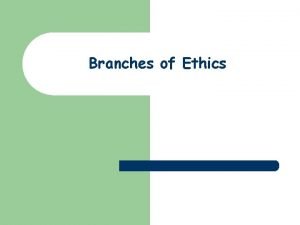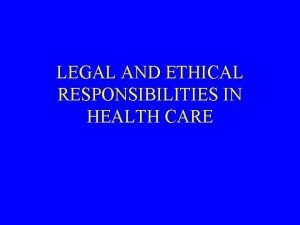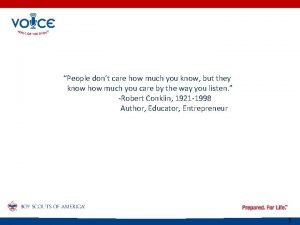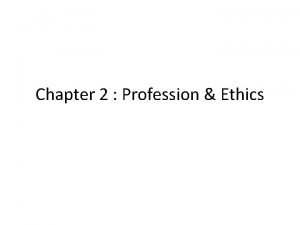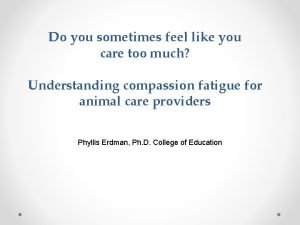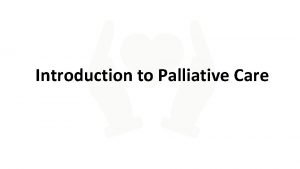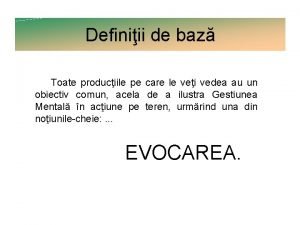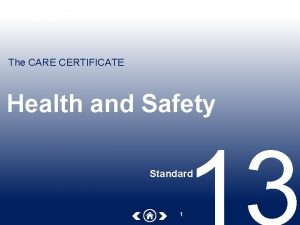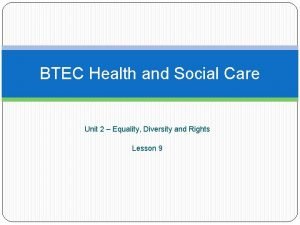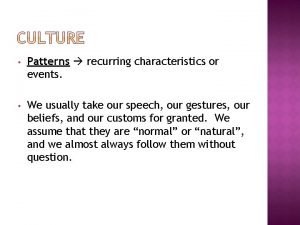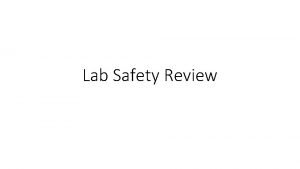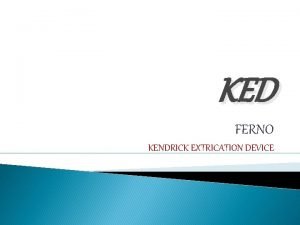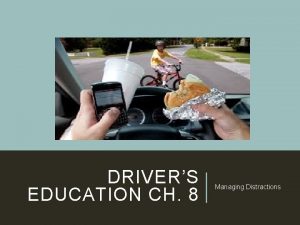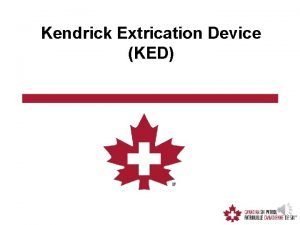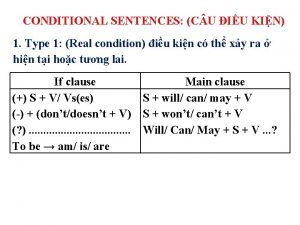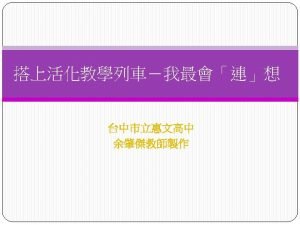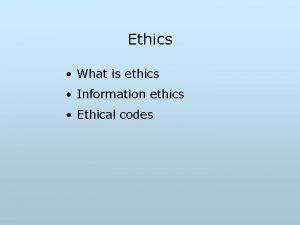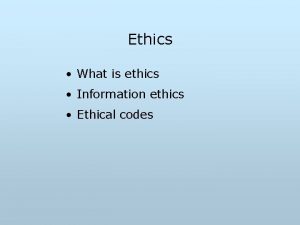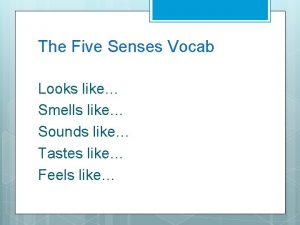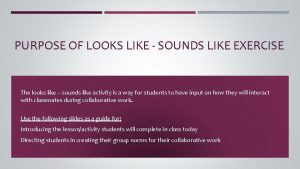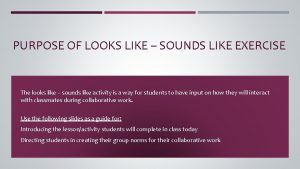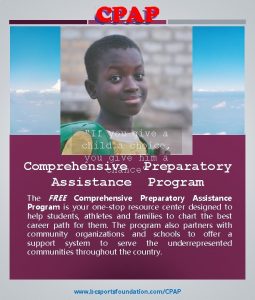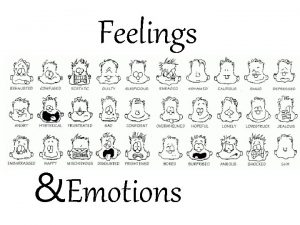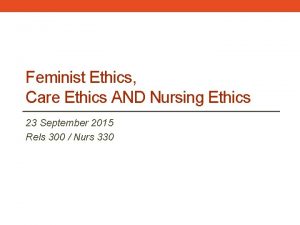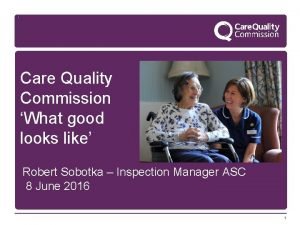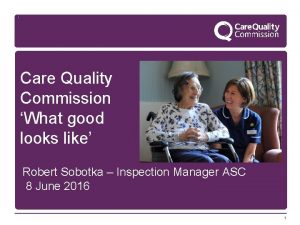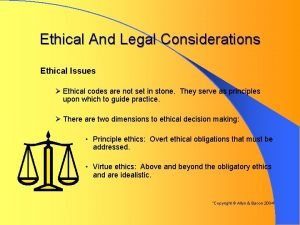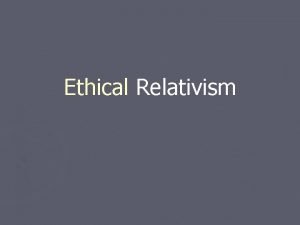ETHICS Ethical Care Looks Like Don Streit LCSW





























































![• [ACA A. 10. f] • “When determining whether to accept…counselors take into • [ACA A. 10. f] • “When determining whether to accept…counselors take into](https://slidetodoc.com/presentation_image_h/a6bc5863bf1b91fa894dbc63fc10ff94/image-62.jpg)










![• “Social workers/[[counselors]] should not engage in solicitation of testimonial endorsements (including solicitation • “Social workers/[[counselors]] should not engage in solicitation of testimonial endorsements (including solicitation](https://slidetodoc.com/presentation_image_h/a6bc5863bf1b91fa894dbc63fc10ff94/image-73.jpg)
































- Slides: 105

• ETHICS • Ethical Care Looks Like……?

• Don Streit, LCSW • (501) 416 -8334 • Newopportunitiessite. com • don_streit@yahoo. com

• NASW Code of Ethics • www. socialworkers. org • Careless Use of Facebook Can Jeopardize Your Career Social Networks are Everywhere: Consider the Ramifications- Frances Patterson, Ph. D, MAC ACA Code of Ethics 2014 SOURCES

• Act 1170 of 2015 • MSWGuide. org • • • Ethics Resources: Ethics Hotline Ethics Shared Interest Group (formerly COI) Ethics Education SWLB Regulations SOURCES

• Ethics consultation telephone calls are answered on a first come first • served basis and are not pre-scheduled. If you call during consultation • hours and receive a voice-mail response, we request your patience as we • complete earlier member calls, Please leave a brief message clearly stating • your name and contact number and we will return your call. Due to the high • call volume, we ask that you allow 24 hours for a return call. Free Consultation for NASW MEMBERS

• The American Counseling Association is pleased to help members with inquiries on ethical practice. This service is not designed to function as a real-time hotline; inquiries are prioritized and the ACA standard is to respond within three business days of receipt. • For questions on ethics, contact the ACA Center for Policy, Practice, and Research at (800) 347 -6647, ext. 321 or through the online Ethics Consultation Services

Practicing distance therapy, legally and ethically by Tori De. Angelis, March 2012, Vol 43, No 3 • (APA. org) • Is It Ethical to Skype with Patients? Claire Zilber, M. D. Psychiatric News, 2 August 2016 https: //doi. org/10. 1176/appi. pn. 20168 a 14 • Ethical Resources

• Be knowledgeable about the laws governing distance counseling and social media. • Only utilize distance counseling after gaining competence through training and supervised experience in this specialty area. • Inform clients about the limits of confidentiality and potential Internet interruptions due to the nature of technology. • Understand the benefits and drawbacks related to distance counseling • Utilize a professional presence if they choose to use social media platforms • Avoid disclosing confidential information through social media. • Utilize informed consent to explain the boundaries of social media. Distance Counseling, Technology, and Social Media (Section H)

National Association of Social Workers. (1996, rev. 2008). Code of ethics. Washington, DC: Author. Retrieved June 10, 2012 from http: //www. socialworkers. org/pubs/code/default. asp. National Association of Social Workers & Association of Social Work Boards (2005). Standards for technology and social work practice. Washington, DC: NASW. Retrieved June 10, 2012 from http: //www. socialworkers. org/practice/standards/NASWT echnology. Standards. pdf ACA Code of Ethics 2014 References

• As a patient care coordinator, you will assist the care team with setting goals for quality assurance and best practices. Specific duties including assessing and screening patients as well as providing them with education about medical processes and procedures. You provide referrals for continuing care and locate community resources for patients. With input from patients, families, and the care team, you create outcome goals and an overall care plan. Some patient care coordinators may also assist with locating funding for special procedures or other patient needs. Care Coordinator Learn. org/articles/Whats_the_Job_Description_of_a_Patient_ Care_Coordinator_

• Compassionate, respectful, team player, critical thinking skills, resourcefulness, leadership skills, emotional stability Your job requires attention to needs of many moving parts– THIS REQUIRES RECORDS BEING COMPLETE and ready for any provider to pick up the file for a seemless Transition. BRAVO to You!!!!!! Challenges of Care Coordinator

• It is formal and can be complicated…. . but also simple! As formal as an ethical violation…as simple as making eye contact while asking permission to enter a member’s home As simple as listening to a member’s needs before delivering your business with them. • Like a robocall DOES NOT Ethics Sounds so Formal!

• Values • Beliefs, preferences, or assumptions about what we think is good and desirable • Ethics reflect our values. What we value…. whom we value…. how we protect what we value…. how we acknowledge and respect what others value. You Couldn’t Steal Them From Me If You Tried

• What/Whom Do You Value? • Property, relationships, job, keepsakes, meaningful documents, memories, promises, etc. • How do you protect “Valuables”– Objects, property, relationships, information, future opportunities? • “Ethics address what to do with or how to apply those beliefs” (Kirst-Ashman 2007) Ethics Reflect our Values

• Values- a principle considered worthwhile or important. • “Values determine what beliefs are appropriate. ” (Kirst-Ashman 2007) • Ethics are derived from values. Guide people on what is “good” and what is “bad. ” • “Ethics address what to do with or how to apply those beliefs” (Kirst. Ashman 2007) • *****Beliefs and Values must be experienced in real life situations or else they are only ink on a page. What good does ink do anyone? DJS Values and Ethics

They drive our significant & meaningful choices in relationships and life goals. AND They can create obstacles to impartial, unbiased treatment of others Dual Nature of Values

• You have been informed that you need to have surgery on your heart. You don’t understand all the “doctor talk” explanation of what the surgeon needs to do to make your heart function correctly, but you DO know you need to have the surgery. How Do You Choose When Your “Heart” is Involved?

• 1. One has been performing surgery for several year. He has an excellent reputation for successful surgeries, but he has been questioned about the “shortcuts” he uses in surgical procedures. He doesn’t like to be questioned because he is a “pro who’s been doing this for a long time. ” • 2. The one who has only been a surgeon for two years. Besides knowing long-time standard procedures, she has also learned new techniques developed in the last couple years. No one is certain about her “success rate” because she is new to the community. Choice of Surgeon

• **What would you want a client/patient or their family to say about how you provided service to them– outside of your hearing? • How do you provide care in a way that might warrant that kind of comment? Your Own Value as Service Provider

• • Property—Who is allowed within boundaries? Relationships– Inner and outer circle? Privacy– Who has the right to know family business? Keepsakes– What is SACRED? Communication (Secrets-Sensitive information) Traditions– Who is family contact person? House rules? Trustworthy friends– Network– Secret keepers Identity………Reputation. . . . Self Respect What/Who Are Your Valuables? How do you preserve– protect?

• Property • Relationships • ++Privacy +++Keepsakes Communication Identity +Who is allowed within my boundaries? Inner and Outer circle +++Who has the right to know my(family business)? What is sacred? Secrets-Sensitive Communication Self-image What Does Respecful Engagement Look Like?

• If/when you are in need of some service…. AS A RECIPIENT…. . What do you need? • What do you need to experience from/in the person serving your needs? • How does a provider convey • Interest…. . caring…. competence…respect? • Safe place…. attention to needs? Client Needs-Engagement

• If/when you are in need of some service…. AS A RECIPIENT…. . What do you need? • If you were in need of services what words would you like to hear your service provider say to you? Client Needs (our needs) Engagement



• Professionals should inform clients as soon as feasible and in language that is understandable about the nature of the professional relationship, the nature of the professional intervention, the professional’s delegated authority and the limits of that authority, which decisions the client can make and which decisions the child welfare professional will make. • Professionals should inform clients of the role of the court, if any, and of their legal and procedural rights. • Professionals should keep clients informed about the case plan throughout the entire intervention. Informed Consent

• Be sure to get clarification about Release of Information documents. Schools? ? • “If there are multiple people that you will be dealing with (e. g. a case worker at a facility and a family guardian) then you may need multiple HIPAA Authorization Forms. ” • Check with your ____ to specify who has permission to see documents. • If at schools…. . Is it administrator, counselor? Just a Reminder

• Webster’s– a choice between equally unfavorable or disagreeable alternatives • When a worker has to choose between and among conflicting duties and values. Weigh which duty/values tip the scale toward one choice rather than another. (Paraphrase from NASW video) SWA Oxygen DILEMMAS

• Communication (Sensitive-Secret) • Text to WRONG person • Conversation w/trusted friend • Emails to or about significant people • Protection- Passwords & Codes • Locked access • Electronic Protection, Accuracy of Complete records B. 6. b ACA What Does It Look Like?

• “Clients who have access to social workers’ social networking sites may learn a great deal of personal information about their social worker(such as information about the social worker’s family and relationships, political views, social activities, and religion), which may introduce complex transference and countertransference issues in the professionalclient relationship. ” (p. 186) REAMER ( 2013 ) RE: Facebook ACA Ethical Standards Casebook 2015

The following steps allow for best practices in decision-making with technology: 1 Develop clear, written guidelines for electronic communication 2 3 4 5 with clients (social media policy). Include use of texting, cell phones, e-mail, distance treatment, and social media. Maintain accurate documentation of services provided electronically, including client authorization for disclosure and informed consent. Obtain client confirmation of notice of privacy practices. Use security measures such as encryption, firewalls, and pass codes. Get adequate technical and policy supports, including privacy and security procedures, protocols, and technologies. SKYPE is not a secure platform GOODGRID is secure------- with training FACEBOOK is full with potential problems Monday, January 27 PROTECT: Technology Tips for Ethical Decision-Making Considerations Ruth Lipschutz, LCSW, ACSW NASW Chapter Illinois

Get adequate clinical, legal, and ethical support (supervision or consultation). 7 Create a reasonable balance between protecting the public and facilitating access to care. - See more at: http: //www. naswil. org/news/chapternews/featured/protect-technology-tips-forethical-decision-makingconsiderations/#sthash. X 2 GUOa 8 p. dpuf 6 Monday, January 27 PROTECT: Technology Tips for Ethical Decision-Making Considerations Ruth Lipschutz, LCSW, ACSW NASW Chapter Illinois

• Care Coordinator Training • “…important for you to develop rapport and trust with the member and their representatives. ” “…take things slowly at your first visit, explaining the services you will provide and answering member’s questions about case coordination. ” Engagement

• Permission to engage • Statement/clarification of your role and intention • Ask and listen…. . ask and listen…. ask and listen • Eye contact • Finding common ground/interest • Dance with your member and member’s family Engagement reflects your respect, interest, capability, dedication…. .

• Rules of Engagement • How to approach • Enter someone’s turfprivileged boundaries- • Language & Purpose • No tech talk • Clarify • Ethical Principle: Social workers respect the inherent dignity and worth of the person. Social workers treat each person in a caring and respectful fashion, mindful of individual differences and cultural and ethnic diversity. Social workers promote clients' socially responsible self-determination. Social workers seek to enhance clients' capacity and opportunity to change and to address their own needs. Listening • • Talker-Listener No Robo-Calls What Does Respectful Engagement Look Like?

• Conflict of Interest(1. 06) • Dual Relationships • The mother of one of your clients expresses gratitude for the way you have managed her daughter’s case. She says should would like to discuss this further and to “show my gratitude” by having coffee sometime. • Build rapport? ? ? Social workers should not engage in dual or multiple relationships with clients or former clients in which there is a risk of exploitation or potential harm to the client. In instances when dual or multiple relationships are unavoidable, social workers should take steps to protect clients and are responsible for setting clear, appropriate, and culturally sensitive boundaries. What Does THIS Standard Look Like?

• Demographic data regarding an individual’s past, present, or future physical or mental health conditions and payment for the health care provided to the individual. • Information related to the provision of health care to the individual. HIPAA PROTECTED INFORMATION

• The Purpose of The Health Insurance Portability and Accountability Act of 1999 is to protect individually identifiable health information while increasing the flow of information between health care providers, health plans, and health care clearinghouses. • HIPAA Pics

Mrs. Cranley! You need to sign this HIPAA privacy form before the doctor can look at those warts on your stomach. Hospital buzz

• I didn’t have a dual relationship………… • A dual relationship had me! Dual Relationships

• Text the Wrong Person? • What were– or COULD BE- the consequences? • It’s just a text, right?

1. 07 Privacy and Confidentiality(NASW) • Privacy- • Meeting times • • Rooms/space Engagement- eye contact; acknowledge the value of their “turf” Workers may disclose confidential information when appropriate with valid consent from a client or a person legally authorized to consent on behalf of a client. Workers should take reasonable steps to protect the confidentiality of electronic communications, including information provided to clients or third parties. ACA– B. 1. b Counselors respect the privacy of prospective and current clients. Coun- selors request private information from clients only when it is beneficial to the counseling process. What Does Code Standard Look Like?

• Communication (Sensitive-Secret) • Conversation w/trusted friend • Emails to or about significant people • Protection- Passwords & Codes • Locked access Protection of records B. 6. b ACA Confidentiality of records and documentation What Does It Look Like?

• Conflict of Interest(1. 06) • Dual Relationships • The mother of one of your clients expresses gratitude for the way you have managed her daughter’s case. She says should would like to discuss this further and to “show my gratitude” by having coffee sometime. • Build rapport? ? ? Social workers/counselors should not engage in dual or multiple relationships with clients or former clients in which there is a risk of exploitation or potential harm to the client. In instances when dual or multiple relationships are unavoidable, workers/counselors should take steps to protect clients and are responsible for setting clear, appropriate, and culturally sensitive boundaries. What Does Code Standard Look Like?

• Non-discrimination 4. 02 • 4. 05 Impairment • Protection of Records– Protection through electronic communication • Privacy and Confidentiality • Competence (4. 01) (ACA) C. 2. a • Sexual intimacy with Clients (1. 09) (ACA) A. 6. e • Private conduct(4. 03) Social W should not permit their private conduct to interfere with their ability to fulfill their professional responsibilities. • Conflict of Interest • Informed consent RANK- Your Priorities The Most(1) to Least(5) Important

• Impairment-Social workers should not allow their own personal problems, psychosocial distress, legal problems, substance abuse, or mental health difficulties to interfere with their professional judgment and performance or to jeopardize the best interests of people for whom they have a professional responsibility. (NASW 4. 05) (ACA C. 2. g) • Conflict of interest(NASW) 1. 06 (a) Social workers should be alert to and avoid conflicts of interest that interfere with the exercise of professional discretion and impartial judgment. • (NASW 1. 03) ACA A. 2. a Informed Consent • Most basic right: Clients have the right to know what they are getting into. Include counselor’s qualifications, techniques, procedures, limitations, limits of confidentiality, potential risks and benefits of services. PUT THESE IN WRITING. • Counselors must be aware of and avoid imposing their own personally held values on clients. (ACA A. 4. b) • RANK 1 -5

• • Competence Counselors should provide services and represent themselves as competent • Nondiscrimination only within the boundaries of their education, training, license, certification, consultation received, supervised experience, or other relevant professional experience. Counselors who use technology in the provision of social work services should ensure that they have the necessary knowledge and skills to provide such services in a competent manner. • Do not condone or engage in discrimination against prospective or current clients, students, employers, . . based on age, culture, disability, ethnicity, race, religion/spirituality, gender identity, sexual orientation, language preference, socioeconomic status, immigration status, etc. • • Protection of Records—Privacy & Confidentiality • Through electronic communication Counselors should protect the confidentiality of all information obtained in the course of professional service, except for compelling professional reasons. The general expectation that counselors will keep information confidential does not apply when disclosure is necessary to prevent serious, foreseeable, and imminent harm to a client or others.

• Sexual Relationships • Social workers should under no circumstances engage in sexual activities, inappropriate sexual communications through the use of technology or in person, or sexual contact with current clients, whether such contact is consensual or forced. Should not engage in sexual activities or sexual contact with clients' relatives or other individuals with whom clients maintain a close personal relationship that has the potential to be harmful to the client and may make it difficult for the counselor and client to maintain appropriate professional boundaries. • 4. 03 Private Conduct • Social workers should not permit their private conduct to interfere with their ability to fulfill their professional responsibilities. •

• Be sure to get clarification about Release of Information documents. Schools? ? • “If there are multiple people that you will be dealing with (e. g. a case worker at a facility and a family guardian) then you may need multiple HIPAA Authorization Forms. ” • Check with your ____ to specify who has permission to see documents. • If at schools…. . Is it administrator, counselor? Just a Reminder

• You have long been a friend with Merlita who has a large extended family that she sees only once a year for a family reunion. She has introduced you to several of those family members when they have been in town. In fact one family member(Natasha) thinks so highly of you that she asked Merlita to ask you if you would be her counselor now that Natasha is divorced and will move into the Little Rock area to help her adjust to the divorce. • Is it ethical for you to be her counselor? What do you need to consider to make that decision ACA (A. 5. d) Friends of Family Members

With all the honesty you can muster………. What kind of client/client population is your favorite to work with? • What are the traits in them you prefer? • What kind is your least favorite to work with? • Traits you dislike or are threatening? • In your own “professional inventory, ” how does (if it does) your preference potentially affect your professional effectiveness with those clients? 4. 02 Non-Discrimination

How do you provide service in a respectful, professional, compassionate, and competent way… when you’re tired, paperwork is tedious, your client doesn’t cooperate with your agreed-upon goals or the client’s case is overwhelming you? Which standards are applicable? How might these kinds of client cases challenge your ethical practice? “Loving” Your Clients

• Standards Challenged • • • Self-determination Respect for client Nondiscrimination “Ethical love” Dual relationship

A sexually abused 16 -year-old girl on a social worker’s related service caseload became distraught one afternoon when she learned her mother was killed in a car accident. She asked the social worker if she would “please hold me, hold me” while they talked about her tragic loss. Physical Contact

It is not unusual for social workers to have some kind of modest physical contact with clients. Social workers must always be careful to distinguish between appropriate and inappropriate physical contact with clients. Social workers should not engage in physical contact with clients when there is a possibility of psychological harm to the client as a result of the contact (such as cradling or caressing clients). Social workers who engage in appropriate physical contact with clients are responsible for setting clear, appropriate, and culturally sensitive boundaries that govern such physical contact. Standards 1. 01, 1. 02, 1. 03, 1. 05, 1. 06, 1. 10, 1. 11, 2. 05, 2. 11, 4. 05 Physical Contact

• Counselors should not engage in physical contact with clients when there is a possibility of psychological harm to the client as a result of the contact (such as cradling or caressing clients). Social workers who engage in appropriate physical contact with clients are responsible for setting clear, appropriate, and culturally sensitive boundaries that govern such physical contact. Physical Contact

DANGER We a re en terin g the zone of po tenti al… “Dea th by Pow erpo int”

• (a) Social workers/counselors generally should adhere to commitments made to employers and employing organizations. • (b) Social workers/counselors should work to improve employing agencies' policies and procedures and the efficiency and effectiveness of their services. • (c) Social workers/counselors should take reasonable steps to ensure that employers are aware of social workers' ethical obligations as set forth in the NASW Code of Ethics and of the implications of those obligations for social work practice. • (d) Social workers/counselors should not allow an employing organization's policies, procedures, regulations, or administrative orders to interfere with their ethical practice of social work. Social workers should take reasonable steps to ensure that their employing organizations' practices are consistent with the NASW Code of Ethics and ACA. 3. 09 Commitment to Employers

The case was opened in March 2014 for Educational Neglect because Melanie had already missed ten days. The school reported that eight year old Melanie had missed twelve days of school during the first semester. The limit per semester is 13 days. The only parent involved is Melanie’s mother, a 33 year old Caucasian female (Sasha). The previous worker had determined that the case should be monitored because there is a pattern of absences. Sasha is an exotic dancer. Her sister (Katrina) stays with Melanie until Sasha returns home from work around midnight on week days, 2 AM on weekend nights. AND

• The previous worker made weekly home visits. He noted the following in his contact notes: “Usually found several empty beer bottles in the trash; even when Melanie made it to school Sasha was still asleep at 9: 00 AM. ” “Teachers reported that Sasha was a loud and aggressive mother— often challenging their discipline of Melanie when she failed to turn in homework; Sasha also had a reputation for blatantly criticizing teachers at PTO meetings. ” • The previous worker noted that Sasha does not have men stay overnight when Melanie is present. What Are the Strengths and Limitations of Adults in Melanie’s World?

• You and your client- Jeanette- have agreed that she has achieved the primary goals of her treatment. You have a mutually respectful relationship and, therefore, a healthy therapeutic bond. Even though she will terminate individual counseling with you, she will begin group therapy provided by another counselor at your office. • Jeanette has been making her own jewelry. She knows the market value of her jewelry. To show her gratitude, she gives you a piece worth $20. • Will you/can you ethically accept her gift? Advantages? ? ? Disadvantages? ? Ethical principles? Receiving Gifts (ACA) A. 10. f
![ACA A 10 f When determining whether to acceptcounselors take into • [ACA A. 10. f] • “When determining whether to accept…counselors take into](https://slidetodoc.com/presentation_image_h/a6bc5863bf1b91fa894dbc63fc10ff94/image-62.jpg)
• [ACA A. 10. f] • “When determining whether to accept…counselors take into account therapeutic relationship, monetary value of the gift, client’s motivation…and the counselor’s motivation for wanting to accept or decline the gift. ” Receiving Gifts ACA

• You have entered the home of a member and his/her family to conduct a monthly assessment. You have some information from the PCP and the member wants to give you information. • There are others in the household who want to show their support and concern for the member/family. The others don’t voluntarily offer to leave the room you’re in and can hear your conversation. You want the visit to remain confidential. • How do you address the others so your conversation remains private and confidential? (They just wasn’t to be supportive. ) Protecting members’ rights to…

Counselors should not allow their own personal problems, psychosocial distress, legal problems, substance abuse, or mental health difficulties to interfere with their professional judgment and performance or to jeopardize the best interests of people for whom they have a professional responsibility. Impairment— 4. 05 ( ACA C. 2. g )

• You are supervisor at a hospice for Nicole– an intern– who was informed 3 months ago that her mother has pancreatic cancer. Prognosis- 3 more months to live. • Nicole honestly admits she has trouble focusing, sleeping poorly at night, and has no interest in working right now. But, she needs her income. She asks you for permission to come in later in the AM and to take breaks to visit her mother during the day. • Technically, she has not been fulfilling her work responsibilities. As supervisor, what can you do to facilitate her performance at work, while considering her impairment?

• • • Decline in quality of work performance Failure to exercise good judgment and decision making Difficulty meeting deadlines or schedules Poor documentation Many mistakes and inaccurate work Leaving work early or arriving late Excessive use of sick time Unexplained absences Mood changes after breaks or lunch Bizarre and/or inappropriate behaviors in the workplace Suspicious attitude toward others Dishonesty Impairment can look like:

• What could be legitimate/valid reasons for not coming to work…. . leaving early……taking leave…. . ? • How much will you allow yourself to function below a level of being effective, compassionate, competent? Excuse……………Valid Reason for ↓ Job Performance?

• You are working with a member and her family who live in your community. You often see them on the street and at the Road Kill restaurant where you eat sometimes. • You know from the extensive history you collected from Carol(member) and family that Carol’s uncle (Robert) is considered by the family to be an alcoholic. They consider his behavior to be repulsive, as he frequently comes to their home and argues with Carol’s father. Carol states she does not want to be around people who drink. Private conduct 4. 02 When you eat at Road Kill, you drink beer or wine with your dinner. What is your responsibility– if any-- to Carol (& family) to drink ( or not) as you please? What values are operating?

• You have been “work friends” with Caroline at the same agency for over 4 years. You leave to work for another agency to provide therapy services at a different clinic. She tells you that she has gained great respect for you because of the way you treat your clients and, now that you will be out of a different work setting than she is, she would like you to be her therapist at your new agency. • What questions need to be asked? • What do you tell her? How do you explain your decision? • How will you and she continue your “friends” relationship? Dual relationships

• Office talk among peers in the presence of other clients or anyone within hearing distance is unethical? ? *#**? ? • Discussion of a member’s case should continue to be confidential at every location. If you say the secret words— even if you whisper— people will listen. (Hospital, office, home…) Derogatory Language 1. 12 Respect for clients

Respect for Client’s Story

• Besides your work as a counselor, you moonlight as a free lance writer for a one of the several local magazines, “Growing Through Grief” that features an advice/self-help column on managing grief and loss. Your column has developed increasing readership and popularity. One of your clients(Gloria) who works for another one of the several local magazines ”Healing through Self-Discovery” tells you the editor is looking for another writer. • Your client obviously thinks highly of your skills (as a therapist). It might really help you if Gloria spoke to her editor about your skills. She doesn’t offer. Do you ask her?
![Social workerscounselors should not engage in solicitation of testimonial endorsements including solicitation • “Social workers/[[counselors]] should not engage in solicitation of testimonial endorsements (including solicitation](https://slidetodoc.com/presentation_image_h/a6bc5863bf1b91fa894dbc63fc10ff94/image-73.jpg)
• “Social workers/[[counselors]] should not engage in solicitation of testimonial endorsements (including solicitation of consent to use a client’s prior statement endorsement) from current clients or from other people who, because of their particular circumstances, are vulnerable to undue influence. ” Testimonials ACA ( C. 3. b ) Solicitations NASW ( 4. 08 )

• • • Physical Contact Dual Relationships Confidentiality Respect for your client And_______ You have arranged for a massage at a local athletic club. The massage room is adjacent to the club. Even though you attend the club occasionally, you used the massage services before. You arrive on time for the massage. The receptionist invites you to have a seat. To your amazement, the massage therapist assigned to you is one of your clients. Both you and the massage therapist (your client) are clearly surprised to see each other. The receptionist notices you both pause to walk back to the massage room. What are your ethical and respect-for-client responsibilities? What(How many) Standards Are Pertinent/Applicable?

• 1. Pretend you thought you would have a different massage therapist (MT) [[Your client]] • 2. Go in for the massage and ask the MT to block everything he/she sees from memory, especially when he/she returns for an appointment (if they do) • OR • Your other options………. . What Are Your Ethical Choices

• Standards Challenged • • • Self-determination Respect for client Nondiscrimination “Ethical love” Dual relationship Physical contact

• 1. 05 Cultural Awareness and Social Diversity • (a) Social workers should understand culture and its function in human behavior and society, recognizing the strengths that exist in all cultures. • (b) Social workers should have a knowledge base of their clients' cultures and be able to demonstrate competence in the provision of services that are sensitive to clients' cultures and to differences among people and cultural groups. • (c) Social workers should obtain education about and seek to understand the nature of social diversity and oppression with respect to race, ethnicity, national origin, color, sexual orientation, gender identity or expression, age, marital status, political belief, religion, immigration status, and mental or physical ability. • (d) Social workers who provide electronic social work services should be aware of cultural and socioeconomic differences among clients and how they may use electronic technology. Social workers should assess cultural, environmental, economic, mental or physical ability, linguistic, and other issues that may affect the delivery or use of these services. 1. 05 Cultural Awareness and Social Diversity

A 15 -year-old high school student was referred to the school-based social worker who provides mental health treatment at a local school to help deal with her depression. For several months the social worker provided the client with counseling to help with the depression. Recently the client lost a great deal of weight; her physician contacted the social worker and expressed concerns about the possibility of a serious eating disorder. The social worker has a lot of clinical experience but did not have training in the treatment of eating disorders. The nearest specialist in treatment of eating disorders is 2 states away. n Standards 1. 01, 1. 03, 1. 04, 2. 05, 2. 06, 2. 10, 4. 01, and 4. 06 n Social workers bear the burden of being forthright in their claims about their areas of expertise to clients, the public at large, colleagues, and employers. Social workers assume considerable risk, and may expose clients to significant risk, when they use controversial interventions. Tablecloth Source: acssw. org/conference/2012/NOLA/Ethics%20 Scenario%201 -3%20%20 Richard%20&20 Tyrone. pdf

1. 04 NASW A. 11. a (ACA) Social workers/Counselors should provide services and represent themselves as competent only within the boundaries of their education, training, license, certification, consultation received, supervised experience or other relevant professional experience. COMPETENCE

• Act 1170 Section 17 -103 -203 Standard D-Misrepresentation 1. 16 Referral of clients 4. 06 Misrepresentation of services

1. 04 Competence-Social workers should provide services and represent themselves as competent only within the boundaries of their education, training, license, certification, consultation received, supervised experience or other relevant professional experience.

• You have been working with a mother and her four children for the last 6 months. You have a positive relationship with her; so much so that she sees you as “mother-mentor” for her. You both live in the same small town. Whenever she spots you in Wal. Mart she stops her shopping and almost runs over to you. She begins “talking business, ” telling you how she has been working on the treatment plan you have set for her. • How do you converse with her, (or do you at all? ) while maintaining professionalism and confidentiality? Dual relationships- Confidentiality

• In the course of working with a client you have met with members of his extended family– aunts, uncles, cousins, etc. • After the case has been resolved and CLOSED, one of the distant relatives calls you to thank you for your compassionate and professional work with her nephew. She asks if you would meet her for coffee so she can communicate her appreciation. What is your response to her? Dual Relationships. Boundaries

• You are a supervisor of medical social workers in a rehabilitation hospital. One of your supervises (David) is working with a 29 year old woman (Caroline) who was paralyzed from the waist down in an auto accident that killed her husband. They were married 5 hours before the accident as they were setting out on their honeymoon. Caroline had already been treated in an acute care hospital for 4 weeks before coming to rehab. You first encountered Caroline in an “adjustment to loss” group. • Caroline cursed whenever a group member spoke about “God’s plans” for her. She yelled, “If that’s the God you believe in then I don’t want any part of the SOB. ” Faith Can Move Mountains

• In gathering a psychosocial history, Caroline told you she used to be a “religious person” before the accident. She taught a Sunday school class, attended church regularly, and did daily spiritual practices. • Your supervisee (David) is convinced Caroline will recover from her traumatic losses if she can find strength in her faith/religious tradition and lifestyle prior to the accident. He plans to help her see how her religious beliefs and practices can be a resource of healing. David admits to you he’s having difficulty hearing her cursing. How would you direct David in his treatment plans for Caroline? [ ACA A. 4. b ]

• You have your own counseling office. Checks are made out to you or your company name under an LLC. You typically deposit checks at one of two bank locations (about 50/50). Your clients’ names are on the check you deposit. • One day one of the bank clerks asks you, “what kind of a business do you have? ” You tell her you have a “counseling business. ” She says, “I’ll bet that is an interesting job, isn’t it? ” • That is the end of the conversation about that. Is That Really Necessary?

• Now that the bank teller has asked you that, should you stop depositing client-identified checks at that bank location? Would it be unethical to continue doing business at that bank location? Necessary? Ethically Cautious?

• Integrity of the Profession • Evaluation and Research TO THE BROADER SOCIETY Social Welfare Public Participation Public Emergencies Social and Political Action Responsibilities to Social Work Profession

Social-Political Action in Service to Profession or Large Community? ?

1. 05(c) Social workers and ACA should obtain education about and seek to understand the nature of social diversity and oppression with respect to race, ethnicity, national origin, color, sexual orientation, gender identity or expression, age, marital status, political belief, religion, immigration status, and mental or physical disability. 1. 05 (c) Cultural Competence and Social Diversity

• A female client who is also a social worker has revealed that she has engaged in dual relationships with her own clients. In one instance, the social worker client hired a former client as a secretary. In another, she invited a client to attend a professional social work seminar and gave the client a ride to the seminar. The social workers client also recently revealed to the caller that she had engaged in a romantic relationship with a former client as well. The caller wanted to know what his responsibilities are in relation to his social worker client’s apparently unethical behavior. Primary dilemma Dual Relationships 1. 06. c 2. 11 Unethical Conduct of Colleague 1. 07 Privacy and Confidentiality

• Does a SW’s responsibility to address unethical conduct of colleague…pertain to misconduct by SW revealed in therapy? • Is responsibility to standard superceded by SW client’s right to confidentiality? Could there be a pattern of misconduct by the SW client? ? ? Risk to + one person? Does this risk fall within responsibility to larger society? Relevant Questions

• You have a client (in any setting) who decides to text you or email you with all correspondences. • How can you direct the means of communication while respecting their preference format? Scenario- Technology

The following steps allow for best practices in decision-making with technology: 1 Develop clear, written guidelines for electronic communication with clients (social media policy). Include use of texting, cell phones, e-mail, distance treatment, and social media. 2 Maintain accurate documentation of services provided electronically, including client authorization for disclosure and informed consent. 3 Obtain client confirmation of notice of privacy practices. 4 Use security measures such as encryption, firewalls, and pass codes. 5 Get adequate technical and policy supports, including privacy and security procedures, protocols, and technologies. Monday, January 27 SOCIAL MEDIA PROTECT: Technology Tips for Ethical Decision-Making Considerations Ruth Lipschutz, LCSW, ACSW NASW Chapter Illinois

Get adequate clinical, legal, and ethical support (supervision or consultation). 7 Create a reasonable balance between protecting the public and facilitating access to care. - See more at: http: //www. naswil. org/news/chapternews/featured/protect-technology-tips-forethical-decision-makingconsiderations/#sthash. X 2 GUOa 8 p. dpuf 6 Monday, January 27 PROTECT: Technology Tips for Ethical Decision-Making Considerations Ruth Lipschutz, LCSW, ACSW NASW Chapter Illinois

• The Code identifies core values on which social work’s mission is based. • The Code summarizes broad ethical principles that reflect the profession’s core values and establishes a set of specific ethical standards that should be used to guide social work practice. • The Code is designed to help social workers identify relevant considerations when professional obligations conflict or ethical uncertainties arise. Source: NASW (2008) Purposes – For the Code

• The Code provides ethical standards to which the general public can hold the social work profession accountable. • The Code socializes practitioners new to the field to social work’s mission, values, ethical principles, and ethical standards. • The Code articulates standards that the social work profession itself can use to assess whether social workers have engaged in unethical conduct. NASW has formal procedures to adjudicate ethics complaints filed against its members. * In subscribing to this Code, social workers are required to cooperate in its implementation, participate in NASW adjudication proceedings, and abide by any NASW disciplinary rulings or sanctions based on it. PURPOSES 4, 5, 6

• DETERMINE whethere is an ethical issue or/and dilemma. Is there a conflict of values, or rights, or professional responsibilities? (For example, there may be an issue of selfdetermination of an adolescent versus the well-being of the family. )

• IDENTIFY the key values and principles involved. What meanings and limitations are typically attached to these competing values? (For example, rarely is confidential information held in absolute secrecy; however, typically decisions about access by third parties to sensitive content should be contracted with clients. )

• RANK the values or ethical principles which - in your professional judgment - are most relevant to the issue or dilemma. What reasons can you provide for prioritizing one competing value/principle over another? (For example, your client's right to choose a beneficial course of action could bring hardship or harm to others who would be affected. )

• IMPLEMENT your plan, utilizing the most appropriate practice skills and competencies. How will you make use of core social work skills such as sensitive communication, skillful negotiation, and cultural competence? (For example, skillful colleague or supervisory communication and negotiation may enable an impaired colleague to see her/his impact on clients and to take appropriate action. )

• REFLECT on the outcome of this ethical decision making process. How would you evaluate the consequences of this process for those involved: Client(s), professional(s), and agency (ies)? (Increasingly, professionals have begun to seek support, further professional training, and consultation through the development of Ethics review Committees or Ethics Consultation processes. )

• Your client is a 28 year old female, Natasha, who says she has met Joe, the man of her dreams. She tells you that Joe is a 31 years old, financially successful, assertive, and an “incredibly romantic” man. Her only concern is that Joe wants her to “limit” contact with her friends and quit her job. Natasha says she knows he is a “little possessive and controlling, ” but he is good to her. She wants to leave her “simple life” and say “yes” to his offer to live with him. In your estimation (because you know her well), she would be taking a risk to say “yes” to Joe. • What questions do you ask her? • As her worker, what do you tell her about her decision? • Is this a matter of Clients who lack decision-making ability (NASW 1. 14) (ACA A. 4. b) “It’s your life. I can’t tell you how to live. ” ”OR CAN I? ”

1. 02 Social workers/Counselors respect and promote the right of clients to self-determination and assist clients in their efforts to identify and clarify their goals. Social workers may limit clients’ right to self-determination when, in the social workers’ professional judgment, clients’ actions or potential actions pose a serious, foreseeable, and imminent risk to themselves or others. 1. 14 Clients who lack decision-making capacity. When social workers/Counselors act on behalf of clients who lack the capacity to make informed decisions, social workers should take reasonable steps to safeguard the interests and rights of those clients. Self-Determination ? 1. 02 Client Lacking in Decision-making ability? 1. 14

• **What would you want a client/patient or their family to say about how you provided service to them– outside of your hearing? • How do you provide care in a way that might warrant that kind of comment? Your Own Value as Service Provider
 What he looks like or how he looks like
What he looks like or how he looks like What he looks like or how he looks like
What he looks like or how he looks like Bbs lcsw forms
Bbs lcsw forms Ron unger lcsw
Ron unger lcsw Julie larson lcsw
Julie larson lcsw Julie larson lcsw
Julie larson lcsw Alison franklin lcsw
Alison franklin lcsw Bipolar spiritual gift
Bipolar spiritual gift Ein körper hatte langeweile
Ein körper hatte langeweile Strum conoid
Strum conoid Achim streit
Achim streit Schiedsrichter im streit um den zankapfel
Schiedsrichter im streit um den zankapfel Primary, secondary, tertiary care
Primary, secondary, tertiary care Perbedaan ethical dilemma dan ethical lapse
Perbedaan ethical dilemma dan ethical lapse Ethical reasoning model army
Ethical reasoning model army Csr and business ethics
Csr and business ethics Ethical habits
Ethical habits Whats the weather like
Whats the weather like How does dollars look like
How does dollars look like 1 cup serving size
1 cup serving size Which organelle looks like a stack of puffy pancakes?
Which organelle looks like a stack of puffy pancakes? What nicotine looks like
What nicotine looks like Metamorphic rocks
Metamorphic rocks Foliated texture that looks like blackboard
Foliated texture that looks like blackboard Anglo saxon days of the week
Anglo saxon days of the week Country that looks like a turkey
Country that looks like a turkey It looks like two parabolas back to back.
It looks like two parabolas back to back. It looks like two parabolas back to back
It looks like two parabolas back to back Preservation of fingerprints
Preservation of fingerprints Grass alliteration
Grass alliteration What organelle looks like a stack of pancakes
What organelle looks like a stack of pancakes With photo
With photo How to use in text citations apa
How to use in text citations apa What is book
What is book Comma before list
Comma before list Tara schenck
Tara schenck Chapter 7 a view of the cell
Chapter 7 a view of the cell What the world looks like
What the world looks like Which of this is not a guided media?
Which of this is not a guided media? What forgiveness looks like
What forgiveness looks like Trapezoid looks like
Trapezoid looks like Cuticle definition forensics
Cuticle definition forensics Types of medullas
Types of medullas Scholastic ethics examples
Scholastic ethics examples Nasw essential steps for ethical problem solving
Nasw essential steps for ethical problem solving Don't take things that don't belong to you
Don't take things that don't belong to you Descriptive ethics
Descriptive ethics Briefly summarise
Briefly summarise Micro and macro ethics difference
Micro and macro ethics difference 6075 meaning
6075 meaning Methaethics
Methaethics Descriptive ethics vs normative ethics
Descriptive ethics vs normative ethics Discipline
Discipline Theological voluntarism
Theological voluntarism Main branches of ethics
Main branches of ethics Utilitarian vs deontological
Utilitarian vs deontological Teleological ethics vs deontological ethics
Teleological ethics vs deontological ethics Legal and ethical responsibilities
Legal and ethical responsibilities Ethical issues in palliative care
Ethical issues in palliative care Don't ask me anything about sports. i like football
Don't ask me anything about sports. i like football If you don't like my story write your own things fall apart
If you don't like my story write your own things fall apart Major scale whole and half steps
Major scale whole and half steps Does she likes pizza
Does she likes pizza Where was george best born
Where was george best born Do you like pears
Do you like pears I don't like cabbage
I don't like cabbage Observability don't care
Observability don't care Karnaugh map exercises
Karnaugh map exercises Vicinix
Vicinix People dont care
People dont care Characteristics of a profession
Characteristics of a profession Moral principles
Moral principles Ethics of care
Ethics of care L would rather
L would rather Ualberta remo
Ualberta remo Which features of the sun look like huge cloudlike arches?
Which features of the sun look like huge cloudlike arches? Why does ethanol look like water but behave more like wood?
Why does ethanol look like water but behave more like wood? Like minds like mine
Like minds like mine I like flowers
I like flowers Language
Language Lawrence kohlberg
Lawrence kohlberg Like father like son in italian
Like father like son in italian I feel like i care too much
I feel like i care too much Care certificate standard 3
Care certificate standard 3 Proprietatea fierului de a fi atras de magnet
Proprietatea fierului de a fi atras de magnet Palliative care versus hospice care
Palliative care versus hospice care Cum se numesc animalele care fac oua
Cum se numesc animalele care fac oua Care sunt simturile prin care sunt evocate
Care sunt simturile prin care sunt evocate The care certificate standard 3 answers
The care certificate standard 3 answers Hip fracture care clinical care standard
Hip fracture care clinical care standard Health and social care unit 2
Health and social care unit 2 What is alliteration in song
What is alliteration in song Looks for patterns recurring characteristics and events
Looks for patterns recurring characteristics and events Script looks pada scratch
Script looks pada scratch If acid is splashed on your skin, wash at once with *
If acid is splashed on your skin, wash at once with * My baby looks hot tonight
My baby looks hot tonight Biomechanical drivers ed
Biomechanical drivers ed An anthropologist looks at ballet summary
An anthropologist looks at ballet summary Fungsi blok looks
Fungsi blok looks Perintah next costum di scratch digunakan untuk
Perintah next costum di scratch digunakan untuk Ked order of straps
Ked order of straps Because you speak english unnaturally
Because you speak english unnaturally He never polishes his shoes, so he never looks smart
He never polishes his shoes, so he never looks smart An anthropologist looks at ballet as a form of ethnic dance
An anthropologist looks at ballet as a form of ethnic dance She's beautiful isn't she
She's beautiful isn't she Looks happy
Looks happy


